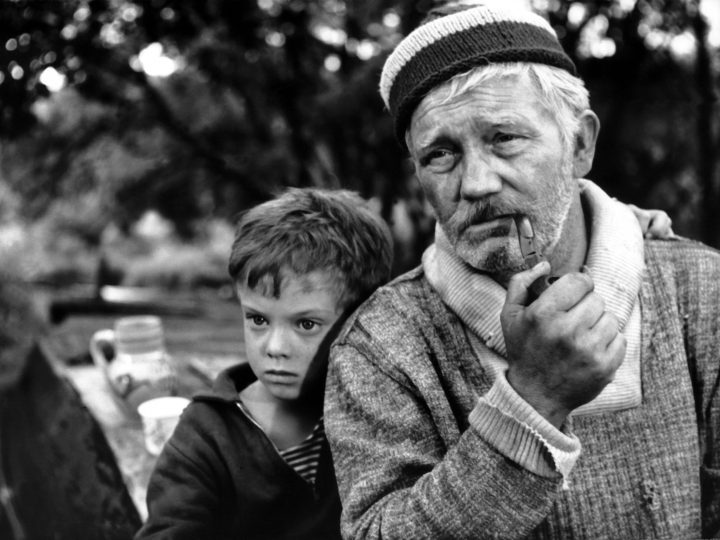Golden Lion of Saint Mark and Silver Minerva from Venice, Golden Pelayo for the Best Contemporary Film from Gijón, Special Mention by the youth clubs from Rimini, plaque of the Association of Spanish Film Writers for the Best Script… this list of awards, far from complete, doesn’t belong to a praised film of the Czechoslovak New Wave. It’s the recognition that a half-forgotten Czechoslovak film from 1966 titled Grandpa, Kylian and I (Dědeček, Kyliján a já) received. Due to its uncomplicated story and pure poetics, which is far from modernist, this film certainly cannot be classified as a New Wave film.
It was the film’s exceptionality in the context of films made by the up-and-coming generation that made conservative critic Jan Kliment say: ‚Aside from the noisily announced titles, aside from the apologetical praise of new waves, our cinemas silently welcomed a film by Jiří Hanibal…’ The director himself also indirectly denounced the new wave, or rather the mood spreading throughout the society. In his explication of Grandpa, Hanibal stated that Jan Ryska’s novella impressed him by omitting disillusion and futility but keeping only pure human emotions and relationships.
For Hanibal, who would later be ranked among directors focusing on films for children such as Milan Vošmik, Jan Valášek and others, this wasn’t a very predictable choice of subject matter. A FAMU graduate, Hanibal collaborated with his fellow students Vojtěch Jasný and Karel Kachyňa on It’s Not Always Cloudy (Není stále zamračeno, 1949) and later debuted with a psychological drama titled People are Everywhere (Všude žijí lidé, 1960) co-directed by Štěpán Skalský. In his following two films, Life Without a Guitar (Život bez kytary, 1962) and School of Sinners (Škola hříšníků, 1965), he focused on the problems of contemporary youth and their clashes with adults. Grandpa, on the other hand, is full of harmonic relationships, even across generations. The film tells the story of a five-year-old boy named Jožka (David Schneider) whose parents, doctors (Jiřina Jirásková, Zdeněk Ornest), go to London for two months. In their absence, their neighbour, Mrs. Pokorná (Slávka Budínová) is supposed to take care of the boy. But Jožka revolts and decides to spend the summer at Grandpa Karpíšek (Rudolf Deyl, jr.) who lives in a house by the river with a donkey named Kylian and a dog named Sultan. Jožka, having only a vague idea where his grandpa lives, takes only his plush rabbit and sets off from Prague to the countryside.
During his journey, he meets kind and helpful people – for instance a group of hikers and a lorry driver. Although the film’s style is quite realistic, the fictional world seems to reflect the guilelessness of a boy who doesn’t expect anything bad from people. The film’s tension doesn’t stem from relationships between the characters – they are always fixed quickly – but rather from the contrasts between the city and the countryside, the modern and the traditional way of life.
Grandpa used to work as a ferryman. But a new bridge across the river is soon to be finished and his work is starting to lose meaning. He has more or less accepted that he will soon leave the house he lived his whole life in and spend the rest of it a retirement home. But he is snatched out of his melancholy acceptance of the new order by the arrival of his grandson who doesn’t passively succumb to reality but casually reacts to it. Jožka sees his grandpa as a natural part of his world and counts with him for the future. To Jožka, the sprightly old man, who doesn’t hesitate to jump in the river, doesn’t belong to the retirement home. And for the resigned Karpíšek, the inquisitive boy becomes an anchor. He regains his vitality and courage to face new challenges at the very moment he saw as the end. The characters from opposite ends of life supplement and enrich each other. The transformation of the older man happens during emotionally layered scenes from the countryside where Karpíšek, thanks to Jožka, finds new pleasure in activities that had become a routine. During the holidays, they go fishing, boating, swimming in the river… After a long search, the crew found an untouched river with a bridge in Soutice near Zruč, at the original Sázava river. But they had to build Karpíšek’s house.
Jožka and Karpíšek travel to Prague to greet Jožka’s parents at the airport on a cart pulled by Kylian. In the bustle and hustle of a big city, the donkey-drawn cart becomes a symbol of the two worlds merging. The boy has managed to convince his grandpa that he would be able to adapt to technological advances just as he himself was able to get accustomed to nature.
Thanks to a sensitive portrayal of the relationship between a grandson and his grandpa and their relationship to nature and animals, the seemingly plain and banal scenes without stylistic ornaments create a parable about life and finding ways to live it meaningfully. From the beginning to the end, in the city and in the country.
Granpda, Kylian and I (Dědeček, Kyliján a já, Czechoslovakia 1967), director: Jiří Hanibal, script: Jan Ryska, Jiří Hanibal, cinematography: Josef Vaniš, music: Evžen Illín, cast: David Schneider, Rudolf Deyl ml., František Vicena, Josef Větrovec, Zdeněk Ornest, Jiřina Jirásková, Slávka Budínová, Josef Hlinomaz, P. Mašek, D. Materna et al. Film Studio Barrandov, 88 min.
Literature:
Dědeček, Kylián a já. Filmové informace 17, 1966, no. 41 (12th october), p. 1.
Jan Kliment, Život stojí za to. Kulturní tvorba 5, 1967, no. 15 (13th April), p. 13.
Hon na jepice. Malou vzpomínku vypráví Jiří Hanibal. Záběr 3, 1970, no. 5 (5th March), p. 3.
Bohumíra Peychlová, Hanibalové. Kino 22, 1967, no. 7, (6th April 4.), p. 2.


